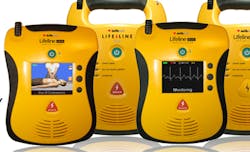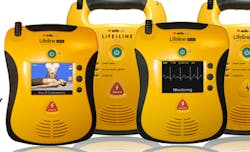Does a dental practice have a common law duty to have an AED available?
By Debra Ford
Spurred by indisputable evidence showing that automated external defibrillators (AEDs) save the lives of sudden cardiac arrest victims, the New York State Dental Association was a prime driver of state legislation mandating AEDs in dental offices statewide. Sudden cardiac arrest strikes about 380,000 Americans each year and is the leading cause of death in the U.S.
While the New York law provides safety benefits to dental patients, it also makes it harder for wrongful death lawsuits to be brought against New York dental practices whose personnel use AEDs. Other states have mandates requiring AEDs in all dental offices or in those using sedation in order to protect patients and dental practices in a similar way.
RELATED ARTICLE: 10 tips to help you prepare for a medical emergency in the dental office
If your dental practice operates in a state without any statutory AED requirement, you may still be subject to a wrongful death lawsuit, under common law, if a patient dies of sudden cardiac arrest on your premises. Airlines, health clubs, transportation authorities, theme parks, and other organizations have paid settlements or damages for failing to have AEDs or for not having staff properly trained to use them. In many cases, damages were paid in the absence of statutes requiring AEDs.
The benefits of AEDs are well known within the dental community
Dental offices without AEDs are vulnerable to this kind of legal action, especially given the nature of dentistry and the availability of continuing education programs about basic life support and emergency response. The mandates in New York and other states recognize the benefits of AEDs, as did the ADA Council on Scientific Affairs when it recommended the placement of AEDs in dental offices.
AED program expert Richard A. Lazar is the founder and president of Readiness Systems, which helps organizations create and maintain operationally ready and risk-managed AED programs. Under common law, judges and juries use the concepts of “community expectations” and “reasonableness” to determine what the standard of care is in a particular set of circumstance, he said. A dental practice may assume that meeting state statutory requirements is the best way to meet the standard of care, but Lazar said, “(Statutory) laws don’t determine what the standard of care is.” Even though your state may have no statute requiring AEDs, a court may rule that having an AED is required to meet the “standard of care” in response to a common law wrongful death lawsuit.
For example, if a patient dies in a dental practice and no AED is available, the attorney representing the patient’s survivors may argue that having an AED is a standard of care by pointing out the recommendation of the ADA council, the statutes in various states, and the availability of education and training about AEDs, basic life support, and emergency response within dental offices.
Would your community “reasonably expect” an AED in your practice?
The jury or judge will then consider whether or not having an AED in a dental practice is a “reasonable expectation.” Put yourself in the shoes of a jury member. Wouldn’t you think a dental practice would have the ability to respond to sudden cardiac arrest, especially when a patient is under sedation?
In the California Supreme Court, the retail chain Target is defending itself against a legal challenge from the survivors of a woman who died of sudden cardiac arrest while shopping in the chain’s Pico Rivera store. No AED was available. Common law duty in California requires commercial property owners to provide “emergency first aid.”
In this case, the court will consider "in what circumstances, if ever, does the common law duty of a commercial property owner to provide emergency first aid to invitees require the availability of an AED for cases of sudden cardiac arrest?" Attorneys have been filing briefs on the case. The dates for oral arguments and decision have yet to be determined.
--------------------------------------------------
RELATED ARTICLES:
AED use doubles cardiac-arrest survival
RDH Event speaker answers questions about equipment and procedures used in emergencies
-------------------------------------------------
AEDs quicken time to defibrillating shock, thereby achieving higher survival rates than EMS
Having an AED in a dental practice rather than depending on EMS to rescue a sudden cardiac arrest victim is important because quickly providing a defibrillating shock is the most important aspect of AED lifesaving. Up to 90% of sudden cardiac arrest victims receiving AED treatment within two minutes survive, but the survival chances decrease with each passing minute. By 10 minutes, most die.
A Johns Hopkins study of response to sudden cardiac arrest found that “speed is more important than training.” Nonmedical volunteers operating AEDs achieved the highest survival rate (40%) – higher than health-care workers (16%) and police (13%), simply because the nonmedical volunteers arrived on the scene sooner, the study determined.
AEDs are easier to use than ever
Recent improvements in AEDs recognize the important role nonmedical rescuers can play in rescuing a victim of sudden cardiac arrest. AEDs are easier to use than ever. All provide real-time audio instructions for rescuers, and some have added video and text instructions and training capabilities.
Today, most sudden cardiac arrest victims don’t have a chance to be saved because an AED is not available. Having an AED in a dental office protects people on the premises by giving them a better chance of surviving sudden cardiac arrest. Dental professionals can take pride that they are providing this safety net. They also can sleep a little better knowing they are protecting themselves from a potential liability lawsuit.
Debra Ford is director of marketing for Defibtech, the designer and manufacturer of the Lifeline and ReviveR families of AEDs and related accessories. Contact her at [email protected], www.defibtech.com, or 866-DEFIB-4-U (1-866-333-4248).

